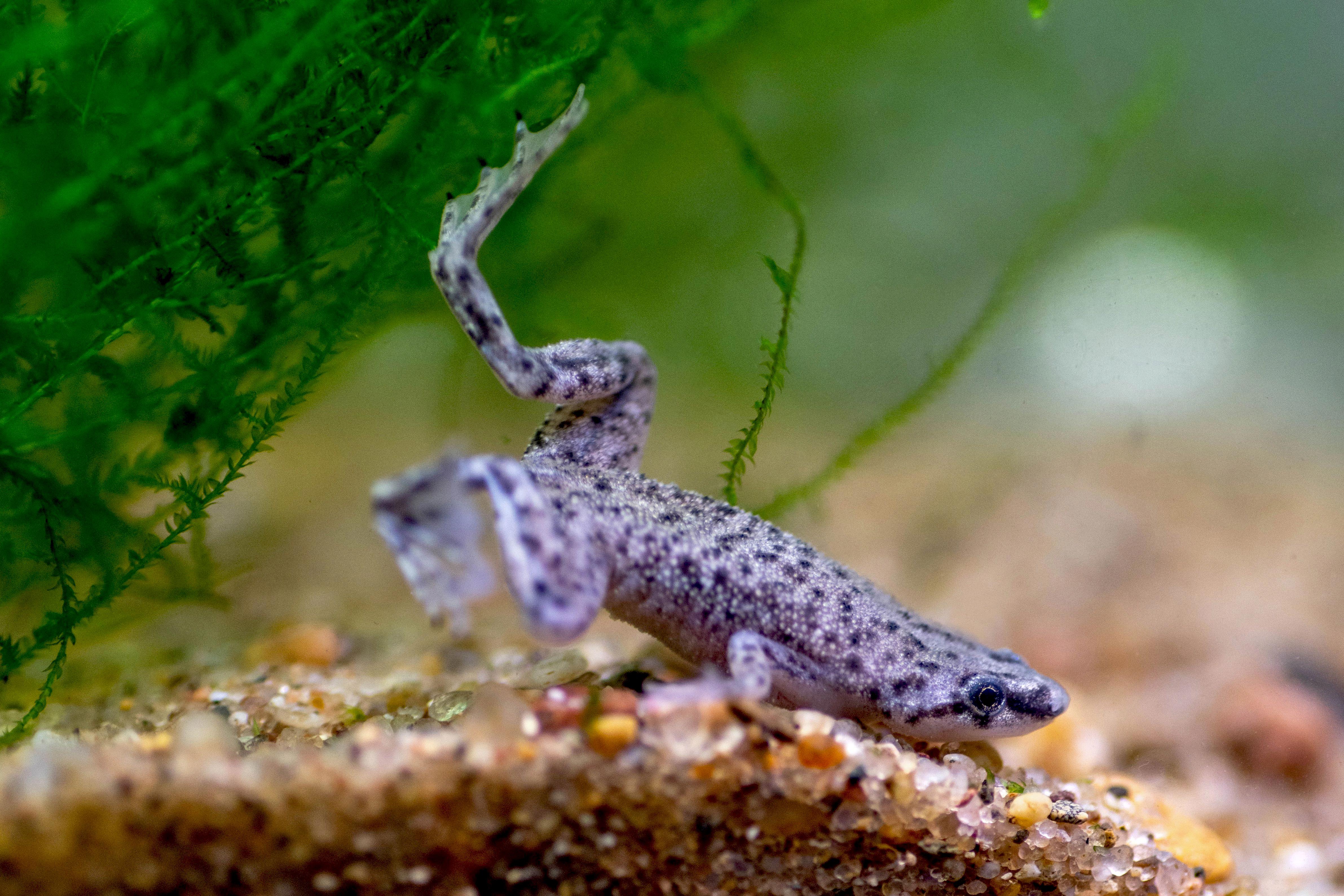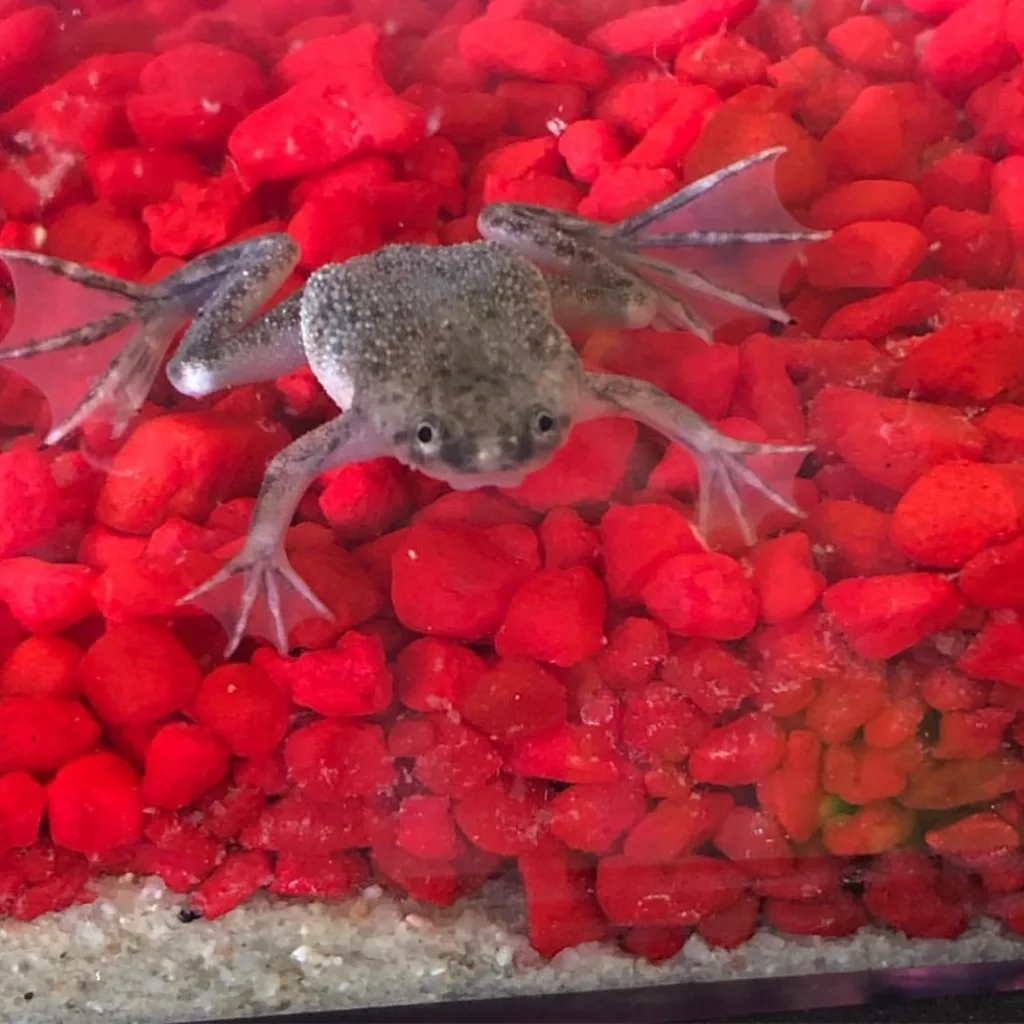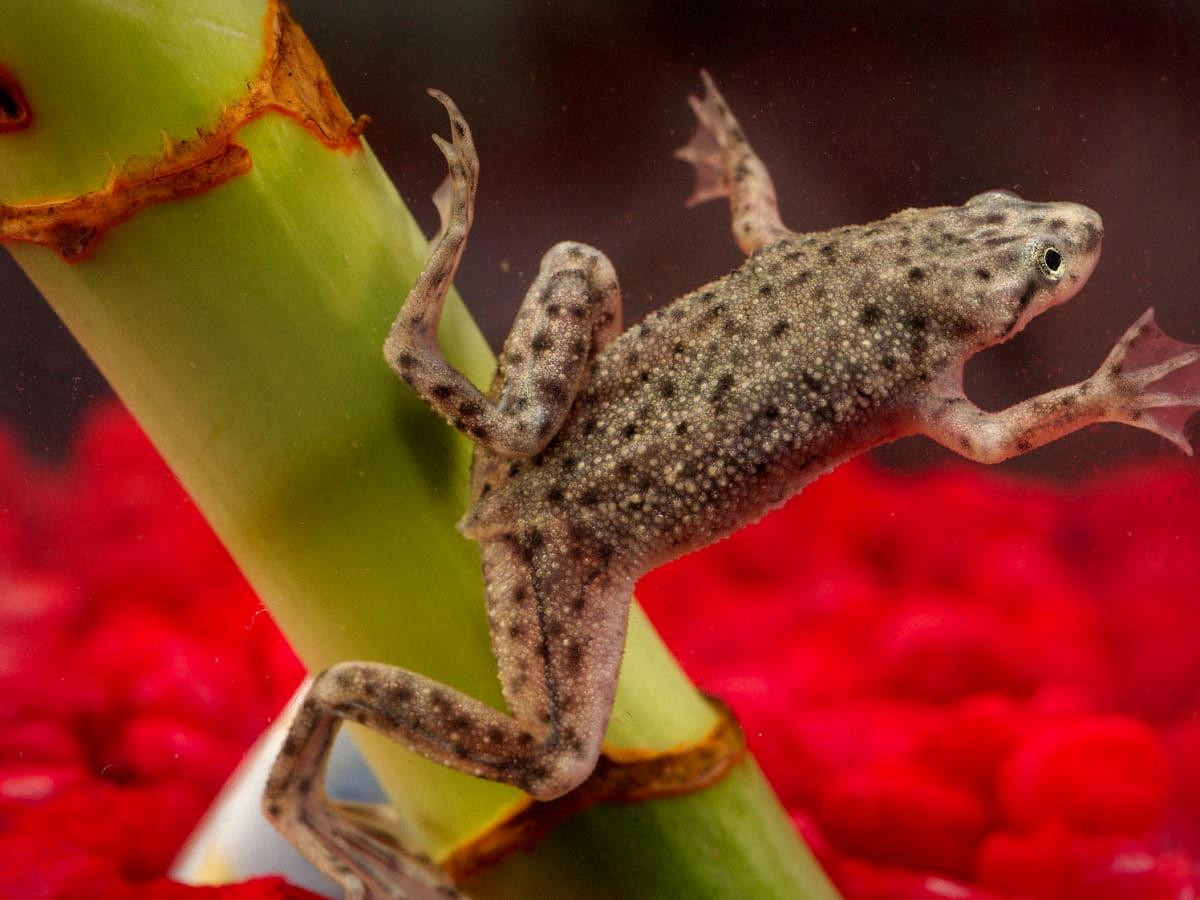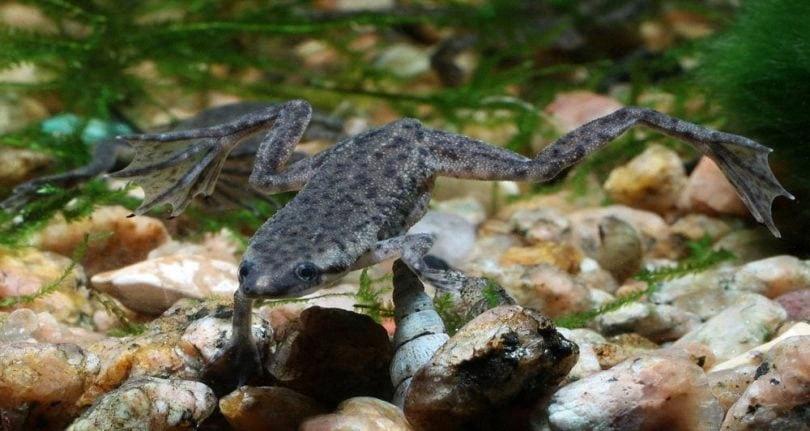African Dwarf Frogs are fascinating aquatic creatures that have become popular pets among amphibian enthusiasts. These small, fully aquatic frogs are native to Africa and are known for their peaceful demeanor and interesting behavior. While they may not be the most vocal of creatures, African Dwarf Frogs do indeed sing, and it’s an important part of their mating ritual.
These frogs are small in size, typically only growing to be around 2 inches long. They have a unique appearance, with a flattened body shape and webbed feet that make them excellent swimmers. African Dwarf Frogs come in a variety of colors, including brown, green, and gray. Their skin is smooth and slippery, which helps them move through the water with ease.
One interesting aspect of African Dwarf Frogs is their breathing. While they are fully aquatic, they still have lungs and need to breathe air at the water’s surface. This means that they spend most of their time underwater but will occasionally come up for air. It’s important to keep this in mind when setting up their aquarium, as they need access to the surface to breathe.
Now, onto the topic of singing. African Dwarf Frogs do indeed sing, although it’s not a loud, boisterous song like you might hear from birds or other animals. Instead, their singing sounds more like a humming or buzzing noise. This vocalization is primarily a male activity, and it’s used to attract females during mating season. The males will sing to try and lure in a mate, and occasionally, females will sing in response.
So, what does a healthy African Dwarf Frog look like? Signs of a healthy frog include actively swimming around the aquarium, hiding in their hideaways, clear eyes and skin, swimming away from capture, and consuming their food quickly and regularly. They should also be interactive with their owners and tankmates and spend most of their time at the bottom of the aquarium.
African Dwarf Frogs are fascinating creatures that make great pets for those interested in amphibians. While they may not be the loudest animals, their humming and buzzing singing is an important part of their mating behavior. By providing a healthy and stimulating environment, you can enjoy watching thse unique frogs thrive in your aquarium.
Do African Dwarf Frogs Make Noise in Aquatic Environments?
Aquatic African dwarf frogs are generally known to be quiet creatures. They do not make any loud or noticeable sounds that can be heard by humans. However, they do make a slight humming noise underwater every once in a while, which is their form of singing. This humming sound is usully not audible to the human ear and can only be heard in very quiet environments. These frogs are mainly aquatic creatures and stay underwater most of the time. They have fully developed lungs and breathe air at the water’s surface. Therefore, they do not need to surface frequently to breathe. Overall, while they do make some noise, it is not something that is likely to be noticed by humans on a regular basis.

Source: thesprucepets.com
The Unusual Singing of Dwarf Frogs
Your African Dwarf Frog is singing because it is a natural behavior that occurs duing the mating season. Male frogs will sing to attract females and establish their territory. The sound they make is similar to humming or buzzing and is part of their mating ritual. This behavior is completely normal and nothing to be concerned about. It is important to note that African Dwarf Frogs should not be kept in pairs as they are solitary creatures, so if you have multiple frogs, it is important to have an appropriate ratio of males to females to avoid any territorial issues.
Do African Dwarf Frogs Sing?
Male African dwarf frogs are the ones that primarily engage in vocalization during the mating season. They produce a series of sounds, also known as a “chuckle”, to attract female frogs for mating purposes. However, it is important to note that female frogs can also produce sounds, but it is a relatively rare occurrence, and vocalization is not a prominent feature of their behavior. Therefore, while both male and female African dwarf frogs have the ability to vocalize, it is predominantly a male activity during the mating season.
Signs of a Happy African Dwarf Frog
African Dwarf Frogs are known for thir unique and interesting behavior, and as a pet owner, you may be wondering how to tell if your frog is happy. There are a few signs that you can look out for to determine if your African Dwarf Frog is content and thriving in their environment.
Firstly, a happy African Dwarf Frog will be active and lively, swimming around the aquarium and exploring their surroundings. They will also be interactive with their owners and tankmates, often coming to the surface to greet you or following your finger as you move it around the tank.
Another sign of a healthy and happy African Dwarf Frog is clear eyes and skin. Frogs with cloudy or discolored eyes, or those with rough or flaky skin, may be stressed or unhealthy.
African Dwarf Frogs also tend to hide often in their aquarium hideaways, and spending most of their time at the bottom of the aquarium. This is a natural behavior for them, and it shows that they feel safe and secure in their environment.
Consuming their food quickly and regularly is also a good sign that your African Dwarf Frog is happy and healthy. If your frog is not eating or seems to be struggling to swallow their food, this may be a sign of illness or stress.
Lastly, a happy African Dwarf Frog will swim away from capture, demonstrating a healthy fear response to potential predators.
Overall, keeping an eye out for these signs of a happy African Dwarf Frog can help you ensure that your pet is thriving in their environment and living their best life.
Creating a Happy Environment for African Dwarf Frogs
African dwarf frogs are generally content creatures that enjoy a few basic things to keep them happy. Firstly, they need a comfortable and spacious environment to swim and explore, preferably with some hiding spots like plants or decorations to make them feel secure. Secondly, they require clean water that is regularly maintained, free of toxins and pollutants. Thirdly, they thrive in a tropical water temperature of 68 to 78 degrees Fahrenheit (20-26 Celsius), which can be regulated with an aquarium heater. Additionally, providing them with a varied and nutritious diet of live or frozen food, such as bloodworms and brine shrimp, will keep them healthy and satisfied. Lastly, African dwarf frogs require some light exposure for 8 to 12 hours a day to simulate teir natural environment, which can be easily monitored with an automatic timer. By providing these simple needs, you can ensure that your African dwarf frog is happy and healthy.

Do African Dwarf Frogs Benefit from Living in Pairs?
African Dwarf Frogs are social animals and thrive in groups. It is recommended to keep them in pairs or groups of at least 3, as this will minimize their stress levels and provide them with a more natural environment. By keeping both sexes in the group, the chances of breeding can also be increased. Therefore, it is highly recommended to keep African Dwarf Frogs in pairs or groups in a tank of at least 15 gallons to ensure their overall health and happiness.
The Meaning of a Frog’s Singing
When a male frog sings, it is a way for him to attract a mate. Frogs have different calls that are specific to their species, and female frogs are able to recognize and locate a male of their own species by listening to their call. These calls can range from high-pitched whirring to deep bonks or insect-like chirps. Male frogs produce these calls by inflating their vocal sacs and expelling air through their vocal cords. The sound produced by the frog’s call can also communicate infomation about the frog’s size, age, and overall fitness to potential mates. Overall, singing is an important aspect of the frog’s mating behavior and a crucial part of their reproductive success.
The Meaning of Frog Chirping
When a frog is chirping, it means that the male frog is trying to attract a mate. The chirping sound is created by the male frog vibrating his vocal cords. This sound is used to communicate with female frogs and to let them know that he is ready to mate. The frequency and speed of the chirping can indicae the frog’s fitness level and physical condition. The faster and more frequent the chirping, the more energy the male frog is expending, which can indicate that he is in better physical condition. Overall, chirping is an important part of the frog’s mating process and helps them to find a suitable mate.
The Significance of a Frog Making Noises
When a frog starts making noises, it typically means that it is communicating with other frogs. The sounds that frogs make are generally a form of vocalization that helps them attract mates, defend ther territory, or warn other animals of danger. Male frogs are especially known for their loud and distinctive croaks, which they use to attract females during the breeding season. Some species of frogs also produce calls that are unique to their species, which help them identify and locate potential mates. In addition to vocalizations, frogs may also use body language, such as waving their arms or inflating their vocal sacs, to communicate with other frogs. So, when you hear a frog making noise, it’s likely that it’s trying to send a message to other frogs in the area.

Source: pethelpful.com
Ideal Number of African Dwarf Frogs to Keep Together
African Dwarf Frogs are social creatures and thrive in groups, so it is recommended to keep them in pairs or small groups of 3-4 individuals. However, it is important to ensure that the aquarium is large enough to accommodate the number of frogs you plan to keep. The rule of thumb is to provide 4-8 litres (1-2 gallons) of water per frog, so a 10-gallon tank would be suitable for a small group of 3-4 African Dwarf Frogs. It is also important to ensure that there is plenty of hiding places and plants in the aquarium to provide a comfortable and stimulating environment for the frogs. By keeping them in groups, you can observe teir social behaviors and enjoy their active and engaging personalities.
Can African Frogs Undergo Gender Transformation?
Yes, African frogs, specifically common reed frogs, have been observed to undergo spontaneous sex changes. This species, which is found in various African countries such as Burundi and Ethiopia, has been subject to scientific study. In fact, a 1989 study found that 7 out of 24 of the frog subjects switched from female to male, which is a paricular type of sex change called protogyny. This means that these frogs start out as females and later transition to males. While this phenomenon is not unique to common reed frogs and has been observed in other species of amphibians, it is an interesting example of the diverse biological processes found in nature.
Do African Dwarf Frogs Benefit from Rocks in Their Habitat?
Yes, African dwarf frogs need rocks in their aquarium. These frogs are bottom dwellers and they require a substrate at the bottom of their tank to rest on. Rocks provide a natural and textured substrate that mimics their natural environment. The rocks also provide hiding places for the frogs and help to create a more natural habitat. Additionally, haing a rock or branch that projects near the surface of the water as the frogs may also rest there, allowing them to gulp air occasionally in order to breathe. Overall, rocks are an essential part of the African dwarf frog’s environment and they should be included in their aquarium setup.
Feeding Frequency for African Dwarf Frogs
African dwarf frogs are known to be voracious eaters and require a regular feeding schedule to maintain their health. As a general rule of thumb, it is recommended to feed your African dwarf frog twie a day – once in the morning and once at night. During each feeding session, offer a small amount of frog food pellets that sink to the bottom of the tank, where these aquatic creatures tend to hang out. It is important not to overfeed your frog, as this can lead to obesity and other health issues. Additionally, you can offer frozen or freeze-dried brine shrimp, bloodworms, and tubifex worms as occasional treats. By following a consistent feeding schedule and providing a balanced diet, you can help ensure the health and wellbeing of your African dwarf frog.

Source: hepper.com
Can African Dwarf Frogs Be Taken Out of Water?
No, it is not advisable to take African dwarf frogs out of water. These amphibians require a moist environment to survive as they breathe through their skin, which needs to be kept wet to allow for oxygen exchange. Taking them out of water for more than 10 minutes can lead to dehydration, which can cause internal organ failure and eventually death. Therefore, it is important to provide them with a suitable aquatic habitat where they can swim and live comfortably.
Do African Dwarf Frogs Sleep at Night?
Yes, African dwarf frogs do sleep, but they may not follow the same sleep patterns as humans. In their natural habitat, these frogs are primarily nocturnal creatures, and they may sleep during the day. In captivity, however, their sleep patterns can become disrupted, and they may become active at any time of day or night. So, while these frogs do sleep, their sleep patterns may vary depending on their environment.
Conclusion
In conclusion, African Dwarf Frogs are fascinating aquatic creatures that make great additions to any aquarium. While they may not be the most vocal of amphibians, they do have a unique humming or buzzing noise that they use during mating season. They are also knwn for their fully developed lungs and ability to breathe air at the water’s surface. To ensure the health and well-being of these frogs, it is important to provide them with adequate hiding places, clear water, and a balanced diet. With proper care, these tiny creatures can live for several years and bring joy to their owners with their playful and interactive personalities.
